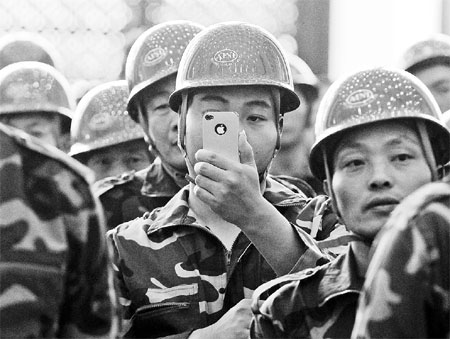Migrant workers have help at hand
Updated: 2012-11-19 08:05
By Zhang Yuchen (China Daily)
|
||||||||
|
Gao Qiang, a migrant worker at a construction site in Beijing, realizes that a smartphone is an indispensable part of his daily life. Zhu Xingxin / China Daily |
|
A migrant worker takes photos with his cellphone at the opening of an art show featuring his peers in Beijing. The use of smartphones is increasing among young migrant workers. Provided to China Daily |

Smartphones give low earners options, reports Zhang Yuchen in Beijing.
Modern technology is not only changing the way people work, it is changing the way people, from the highest earners to the lowest, live.
Tang Jianhua, a mother of two, is working at a construction site in northwestern Beijing. She opted for construction work three months ago after she moved up from southern China because of higher pay.
One of the major financial outlays for Tang, 38, was to buy a smartphone for 900-yuan ($144). And after tragedy struck, it also helped rebuild her life. Following the death of her husband, she was able to keep in touch with family and friends and through modern technology, start the painful but necessary process of rejoining society.
She posted messages online via her smartphone and through this connection met someone and later remarried.
Tang's story may be a simple one, but it reflects the situation of low-grade workers, who have only recently embraced technology.
"Smartphones are like vitamins to these people," said Kuang Wenbo, a professor of communications and journalism at Renmin University in Beijing.
According to a survey of blue-collar workers conducted in May, 74 percent of the 22,380 respondents said they accessed the Web through their phones. The survey, conducted by Daguu, an online employment services company that focuses on market demand for low-end labor, indicated that phone use among migrant workers is 2 percent higher than the national average.
Migrant workers account for 60 to 70 percent of smartphone purchases, said a saleswoman named Li who works at the Zhongguancun IT compound, a technological hub in the Haidian district of Beijing.
The workers use their phones to look for jobs, make online purchases, search for information and, most prevalently, play online games and read literature. Their Internet service fees may be as much as 200 yuan per month.
"Because of their living and working habits, these workers have limited access to the outside world through newspapers or other forms of media," said Kuang, "Smartphones have become the most convenient way of keeping up with events and family."
By the second quarter of this year, 45 percent of the handhelds used by Chinese people were smartphones, 33.7 percent of which cost 700 yuan to 1,000 yuan, according to Sino Market Research, a research institution affiliated with the National Bureau of Statistics.
Experts explained that the wide variety of options available in brands and prices means that this easily neglected group, have a chance to change their lifestyles.
Entertainment, shopping
Zhao Yongchao has been working on external insulation work at a residential building in Haidian since July. With the next construction project settled, Zhao will soon leave for another region, a suburban county located in Northeast Beijing.
Most of the day is spent on tedious and laborious tasks, but the 28-year-old migrant worker's smartphone provides his colleagues with convenient shopping opportunities and entertainment.
A work colleague used Zhao's iPhone, a gift from his sister, to buy a 500-yuan outfit, consisting of shoes, pants and jacket: "I'm quite satisfied," said Wang Cong, looking down at his pants and brushing off the dust.
In addition to shopping, online money transfers have become a monthly favor Zhao performs for colleagues. They give him the cash and he does the rest.
"Every month they give me the money they want to pay into the bank. I log onto the online banking application on my smartphone and transfer the money to the bank," Zhao said, "I have downloaded applications from two banks. They work very well,"
Each transfer costs Zhao 1 yuan, but that "doesn't matter" compared with the friendships he has built with his co-workers.
When bad weather keeps the workers confined to their shabby hut at the site, Zhao's smartphone provides entertainment, "For us, films and entertainment programs are good time-killers," he said.
Of course, there are times when he misses his family desperately, but the video function on his phone makes short work of the distance between Zhao and his home village in Henan province.
He has video chats with his family two or three times every week. Standing in the street and connecting with the Wi-Fi in a neighboring shop, Zhao talks to his wife "face to face", learns about recent events in the village and discusses the academic performance of their 6-year-old twins, a boy and a girl.
"The other day when I stood near the site, I had a video chat with them via my phone for almost half an hour. My wife sat on a chair and the kids stood on either side. They kept asking questions, like 'Dad, when are you coming home?' or 'Dad, we want birthday gifts'," said Zhao. The link helps to assuage his loneliness.
Back in 2010, before Zhao used a smartphone, family chats such as this only happened every couple of weeks. Sometimes contact was lost for longer if Zhao couldn't find an empty seat at a Internet bar, or his neighbor's computer was being used by someone else.
By the end of June, mobile Internet traffic in China had increased tenfold from the end of 2010, according to Wu Heshuan a member of the Chinese Academy of Engineering at a news conference for the release of a report on telecommunications in China.
Kuang said the migrant workers' lower educational background is no longer a communication barrier between them and the rest of society.
Although Zhao, whose formal education ended after middle school, has applied for jobs via his smartphone, he usually chats with strangers on a variety of Websites: "I never take it seriously, but it eases my loneliness," he said.
Still different
Around 230 million migrant workers across China benefit greatly from the improvements in life available through smarter handhelds, but experts said real change may be a long time coming.
A survey jointly conducted by Hong Kong Polytechnic University, the Chinese Academy of Social Sciences and Peking University in Beijing, shows that migrant workers didn't use high-end smartphones a few years ago. "You can't expect a small handset to change the world completely," said Shen Chonglin, a researcher at the Institute of Sociology at CASS, "and because making real, quantifiable change is not easy, the workers often engage in a mild form of escapism via the Internet".
"I feel I've caught up with the pace of development," said Ren Yanqiu, a 25-year-old migrant worker from Hunan province. "Since everyone has a smartphone now, I'd be embarrassed to take an ordinary one out of my pocket. Moreover, we migrant workers can afford smartphones now. Basically, all the young people around me have a high-quality smartphone." Ren bought a Samsung model for 2,000 yuan in Guangzhou in August.
However, mainstream society's view of migrant workers is unlikely to change anytime soon, according to Shen.
Tang Jianhua said discrimination against migrant workers is as strong as ever. "People still despise us, whether we are sitting in a restaurant or packed into a subway car like everyone else, I can feel it," she said.
A two-way understanding between society in general and the migrants is unlikely to be fully realized anytime soon, according to Kuang.
"I only posted a thread or two when I was in a bad mood, or I changed my 'profile'," said Ren Yanqiu, the middle-school dropout, who was born in 1987. He said that he makes sure his smartphone is close at hand whenever he's available to chat, but he rarely bothers about the social issues that generate heated discussion on micro blogs. In fact, very few of the migrant workers interviewed by China Daily displayed any interest in hot social topics because they don't feel fully integrated as members of society.
"They may be better referred to as 'floating workers', because their personal circumstances are quite unsettled," said Shen, the CASS researcher.
The younger generation, the most prominent consumers of developing mobile technology, are the group most likely to reap major benefits from societal changes over time.
"Even though they care little about significant political issues or events right now, they are deeply concerned about things that relate to themselves or members of their peer group," said Kuang. "Maybe their social interaction will become more prevalent as time passes and they begin to feel more integrated with mainstream society."
Contact the reporter at zhangyuchen@chinadaily.com.cn
Mo Jingxi, He Na and Jiang Xueqing contributed to this story.
(China Daily 11/19/2012 page5)

 Relief reaches isolated village
Relief reaches isolated village
 Rainfall poses new threats to quake-hit region
Rainfall poses new threats to quake-hit region
 Funerals begin for Boston bombing victims
Funerals begin for Boston bombing victims
 Quake takeaway from China's Air Force
Quake takeaway from China's Air Force
 Obama celebrates young inventors at science fair
Obama celebrates young inventors at science fair
 Earth Day marked around the world
Earth Day marked around the world
 Volunteer team helping students find sense of normalcy
Volunteer team helping students find sense of normalcy
 Ethnic groups quick to join rescue efforts
Ethnic groups quick to join rescue efforts
Most Viewed
Editor's Picks

|

|

|

|

|

|
Today's Top News
Health new priority for quake zone
Xi meets US top military officer
Japan's boats driven out of Diaoyu
China mulls online shopping legislation
Bird flu death toll rises to 22
Putin appoints new ambassador to China
Japanese ships blocked from Diaoyu Islands
Inspired by Guan, more Chinese pick up golf
US Weekly

|

|








